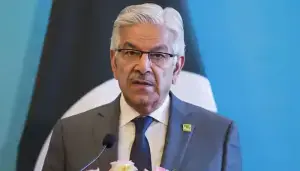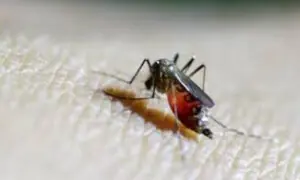EU approves AstraZeneca jab as WHO warns against 'vaccine nationalism'
6 min readThe European Union on Friday approved the Oxford-AstraZeneca coronavirus jab for use on all adults as the World Health Organization warned wealthy countries against "vaccine nationalism", saying it will only prolong the pandemic.
Coronavirus outbreaks are raging around the globe with Covid-19 deaths nearing 2.2 million, and while some parts of the world are fighting over limited vaccine supplies, there are fears the less privileged will not get access for a long time.
The vaccine developed by AstraZeneca and the University of Oxford became the third to get EU approval after Pfizer/BioNTech and Moderna, but it came under the shadow of a bitter diplomatic row with Britain over which countries will get the scarce doses currently available.
"I expect the company (AstraZeneca) to deliver the 400 million doses as agreed," tweeted European Commission chief Ursula von der Leyen, as she announced the authorisation.
The British-Swedish firm has admitted it will only be able to deliver a fraction of the doses promised to the bloc in the short-term due to production problems, saying there is not enough to fulfil supply promises to both Britain and Europe.
The supply issue is a huge blow to Europe's already stumbling vaccine rollout, setting it on a collision course with Britain, which left the bloc just weeks ago.
In a sign of the growing tensions, the EU on Friday released a redacted version of its contract with AstraZeneca, while announcing a mechanism that could allow it to deny the export of vaccines made on European soil.
But it backtracked on a threat to restrict exports to Northern Ireland after Britain voiced "grave concerns".
- 'Vaccine nationalism' - The EU-Britain tussle has highlighted the impact of shortages on ambitious mass vaccination programmes, even on wealthy nations, and fears are growing that the developed world is hogging doses, leaving poorer nations behind.
World Health Organization chief Tedros Adhanom Ghebreyesus warned Friday against "vaccine nationalism", saying there was a "real danger that the very tools that could help to end the pandemic -– vaccines –- may exacerbate" global inequality.
Parts of Africa and Asia have only just started securing and rolling out vaccinations.
The global scramble for shots comes as more troubling data emerges on new variants of the coronavirus, which is known to have infected more than 101 million people worldwide.
The variants first detected in Britain, Brazil and South Africa are believed to be more contagious.
Scientists are concerned that the South African variant may elude some vaccines, a potential stumbling block in the global effort to defeat Covid-19 through mass inoculation.
New data on Thursday and Friday showed average effectiveness of 89 and 66 percent for shots from Novavax and Johnson & Johnson.
But while Novavax's jab was highly effective against the British variant, both were less effective against the South African strain.
Pfizer and Moderna have said their vaccines are effective against the variants.
In a separate but closely watched scientific mission, WHO experts continued their investigation Saturday in Wuhan, China, where the coronavirus first emerged in late 2019, hoping to uncover more clues about the origins of the pandemic.
They visited Jinyintan hospital, which received the first patients officially diagnosed with Covid-19.
- Australian Open boost - With vaccine rollouts still in their early stages, movement restrictions remain among the few options for governments to try to stop the spread of Covid-19.
Surges across continents have overwhelmed healthcare systems even in rich countries like Britain and the United States, while Mozambique President Filipe Nyusi warned that hospitals across southern Africa were "rapidly reaching the limit of their capacities".
Citing concerns over the new strains, Germany on Friday said it would ban travel from countries where the new variants are prevalent starting this weekend, while Canada announced hotel quarantine for all new arrivals.
France has announced the closure of its borders to all non-EU travellers except for essential travel.
The pandemic has shredded the international sports calendar, with doubts growing about the already delayed Tokyo Olympics.
But there was some good news out of Australia, which has largely kept its outbreak in control because of aggressive travel restrictions.
Australian Open organisers said Saturday that between 25,000 and 30,000 tennis fans will be allowed to watch the season's opening Grand Slam.
AstraZeneca hit by delays, disagreements Only a few weeks ago, Anglo-Swedish pharmaceutical giant AstraZeneca was being applauded for the speed with which it developed its Covid-19 vaccine.
Experts heralded the launch of the jab as a turning point in the pandemic, not least because it can be transported and stored more easily than its Pfizer/BioNTech counterpart.
The Anglo-Swedish firm also won plaudits for promising to provide the vaccine on a non-profit basis to lower- and middle-income countries.
Now the vaccine has become a headache, with questions about its effectiveness, and potential litigation because of delays in delivery to the European Union.
On Friday, the European Commission published the contract it signed with the drugs group, showing AstraZeneca's commitment to produce 300 million doses of the vaccine.
A day earlier, an inspection of a Belgian plant producing the vaccine was carried out at the request of the European Commission to examine production problems at the site.
Italy raised the prospect of legal action -- which would also target Pfizer -- to "get back the promised doses".
Germany's Robert Koch Institute also questioned the effectiveness of the jab among the over-65s, citing gaps in test data.
All of these tensions came as the EU mulled approval of the AstraZeneca jab which was granted on Friday. It was the third Covid vaccine authorised by the European Medicines Agency.
The Financial Times said on Friday the "souring" relationship with the EU "could hurt the pharma group".
- 'Vaccine nationalism' - "Neither side comes out of this particularly well," CMC Markets analyst Michael Hewson told AFP, adding that the disputes showed why "the prospect of vaccine nationalism is so worrying".
He cautioned that "if the EU follows through on its threat to impose an export restriction," there could be a knock-on effect of "countermeasures" from other nations like the UK if supplies slow.
The contract with the EU stipulates that AstraZeneca committed to its "best reasonable efforts" to manufacture and distribute the doses.
David Greene, a partner in the law firm Edwin Coe and president of The Law Society in the UK, said the contract remained "straightforward", even if the group was not providing the shot for profit.
He added that the contract with the EU was governed by Belgian law, and, as such, "the only place it can be litigated is in Belgium".
If AstraZeneca does not demonstrate that it is using its "best reasonable efforts" to respect its commitments, said Greene, it could have breached its contract and risks potential lawsuits.
But Russ Mould, an analyst for the online broker AJ Bell, said the financial consequences of the recent spat needed to put in context.
"The German questions about the AstraZeneca-Oxford vaccine, and the US FDA's apparent unwillingness to approve it, are unfortunate and may not be helpful for the FTSE 100 firm's reputation, but many other countries seem happy to keep on using it," he said.
Mould added that the vaccine's low price meant that "the hit to profits is likely to be limited" and attributed a recent decline in the drug group's share price to "investor concerns over the proposed $39-billion cash-and-stock purchase of (pharmaceutical firm) Alexion".
Susannah Streeter, an analyst at Hargreaves Lansdown, believes the pandemic had allowed the group to gain expertise in vaccines, which it lacked in the past.
"The fact that it is so sought-after, to the extent supplies have led to intergovernmental spats, is unlikely to lead to a long-term reputational hit," she said.
"Instead it is more likely to draw attention to the significant contribution the company has made."
AFP
For the latest news, follow us on Twitter @Aaj_Urdu. We are also on Facebook, Instagram and YouTube.



























Comments are closed on this story.